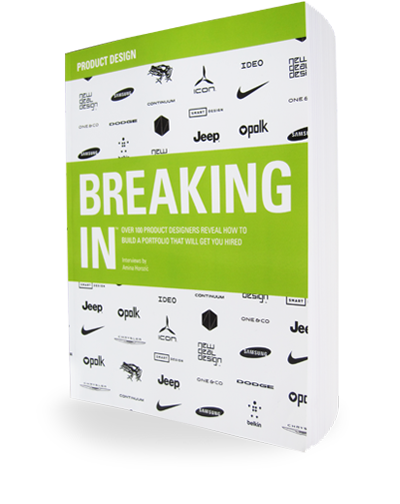Check out some great work from Anton Ljunggren.
As you’re looking to grow your team, what kinds of industrial design portfolios would get your attention? What would bring in an industrial designer for an interview?
As a start-up with a smaller team, we look for multifaceted individuals who can play different roles at different stages of the process. In contrast to a consultant, we define our own projects, plan our own product pipeline, and set up our own timelines. That means there are great opportunities to affect the direction of the business, which in turn means a lot of responsibility. We look for all the basic skills of the trade such as research, sketching, and most importantly, the ability to identify an opportunity, understand any potential challenges, and solve for them through great design. Passion, curiosity, and self-motivation are other essential qualities as we look to grow our team.
Have you seen a portfolio recently that really stood out? What about it caught your eye?
When I look at portfolios I look at what makes it unique. It can be the projects they choose to work on, the solutions they come up with, or the way it’s presented. If there is passion and a strong vision in the work, it will shine through.
What are some common mistakes you’ve seen junior designers make in their portfolios?
The unfortunate reality is that the review process of design portfolios is often stressed, leaving little room for in-depth understanding of each concept in the first round. It is therefore important to build your portfolio with a clear and purposeful visual hierarchy. In a 30-second first pass, I should get the high-level of each project and walk away impressed and wanting to come back for more. Make the presentation as visual as possible and try to capture the take-away from each page in the headline, so that it can be understood at a glance.
[ … ]
If an industrial design student came up to you and asked, “What should my portfolio be like? What do I need to show you in order to work with you?”, what would you tell them?
I want to be surprised by the energy and creativity in your thinking. Industrial design is about problem solving. Show me that you see what is broken around us and that you have ideas for how to fix it. Think about what you can bring to the table that can compensate for your lack of experience.
[ … ]
What do you expect to learn from a designer during an interview?
I want to see the reasoning behind the work. Why they made the decisions they made and how they came to their conclusions. One of the best crits I ever attended was at an architecture school. The professor asked one question again and again. He asked: “Why?” There was often some reasoning at the surface, but when he kept pressing the students, many of them came to the realization that they had actually made their decisions based on assumptions or their own likes and dislikes, rather than the needs of the users or other objective constraints.
[ … ]
What characteristics or qualities are necessary to be a successful designer these days?
Curiosity, cross-disciplinary thinking, and openness to explore how to use your skills in different disciplines.
Can you talk a bit about your decision to join a startup and what industrial design can bring to the table in that type of environment?
As a consultant, you get experience in a wide variety of fields working with different industries, clients, and products. You learn to solve all kinds of problems, often on very short timelines. What you don’t get to do as often is to follow through and see the product all the way from start to finish. You often enter too late to define the product, or you hand it off too early and don’t get to control the details through to production. At a startup, no one is going to tell you what to make. You need to define who you are, what you should make, and how to go about making it. I feel very lucky to work at a product-based startup where I get to help form the brand, the design language, and the vision for where to take the company.
[ … ]
If you were just starting out now, what advice would you give yourself?
Learn as much as you can. Work with great people and build your network to one day start your own business. Not everyone has the will, or drive, to start something from scratch, but if you do, you should do it early when you have time to fail and come back again.
Maintain a vision for what you want out of your career and your life, and check in with yourself every couple of months. Ask yourself if you are achieving what you set out to. Continuously re-evaluate your goals and never settle.
[ … ]

Anton Ljunggren of BioLite

Comments are closed.